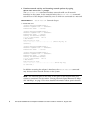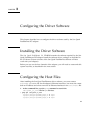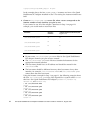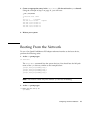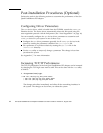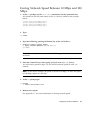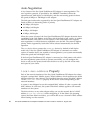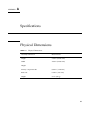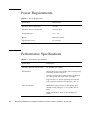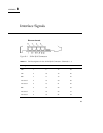
Auto-Negotiation
A key feature of the Sun Quad FastEthernet PCI adapter is auto-negotiation. The
auto-negotiation protocol, as specified by the 100BASE-T standard, selects the
operation mode (half-duplex or full-duplex), and the auto-sensing protocol selects
the speed (10 Mbps or 100 Mbps) for the adapter.
The link speed and modes supported by the Sun Quad FastEthernet PCI adapter are
listed as follows in decreasing order of priority:
100 Mbps, full-duplex
100 Mbps, half-duplex
10 Mbps, full-duplex
10 Mbps, half-duplex
When the system is booted, the Sun Quad FastEthernet PCI adapter advertises these
capabilities to the Link Partner at the other end of the link (a hub, switch, or another
network interface card (NIC) in a host system). If the Link Partner also supports
auto-negotiation, it will advertise its capabilities over the link. The common highest
priority mode supported by both sides will be selected automatically for the link
operation.
The qfe device driver operates the SUNW,qfe devices by default in half-duplex
mode only. If the Sun Quad FastEthernet PCI adapter is connected to a remote
system or interface that is not capable of auto-negotiation, your system automatically
selects the speed and half-duplex mode.
If the Sun Quad FastEthernet PCI adapter is connected to a link partner with which
the auto-negotiation protocol fails to operate successfully, you can configure the
device to not use this protocol and force the driver to set up the link in the mode
and speed of your choice.
local-mac-address Property
Each of the network interfaces of the Sun Quad FastEthernet PCI adapter have been
assigned a unique MAC (Media Access Control) address, which represents the 48-bit
ethernet address for that channel. The OpenBoot firmware reports this MAC address
via the local-mac-address property in the device nodes corresponding to the
network interfaces.
A system is not obligated to use this assigned MAC address if it has a system-wide
MAC address. In such cases, the system-wide MAC address applies to all network
interfaces on the system.
The device driver, or any other adapter utility, can use the network device"s MAC
address (local-mac-address) while configuring it. In the Solaris 2.6 operating
system (and later Solaris revisions), you will be able to use a channel"s MAC address
when booting over the network.
16
Sun Quad FastEthernet PCI Adapter Installation and User’s Guide ♦ Revision A, August 1997



